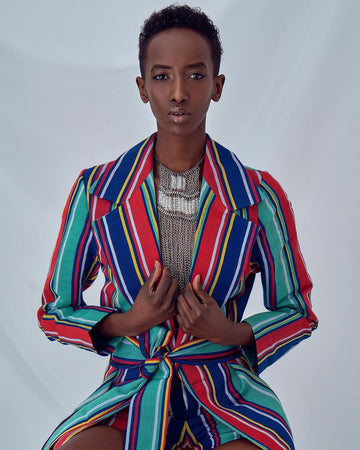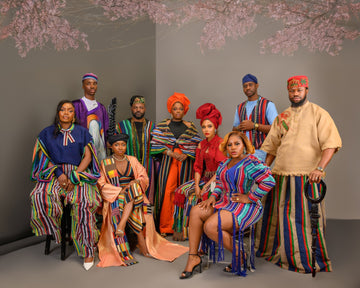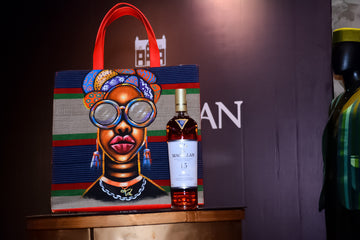Africa Day is celebrated annually on May 25 to commemorate the establishment of the Organization of African Unity in 1963. It is observed in various countries across Africa and worldwide to honour the continent's unity and progress.
Africa Day is a time to celebrate the vibrant cultures, histories, and achievements of the African continent. When it comes to African fashion, there is so much to commemorate. The tradition of clothes weaving, the fabrics, the process and styling. One of the most iconic symbols of African heritage is Aso-Oke, a traditional fabric that embodies the spirit and craftsmanship of the Yoruba people. Known as Aso Ofi, which translates to "fabric created on the wooden loom," Aso-Oke stands as a testament to the timeless artistry passed down through generations.

The History of Aso-Oke

Originating from the town of Iseyin in Oyo State, Nigeria, Aso-Oke is the traditional fabric of the Yoruba people which means -cloth from the upcountry. Handwoven from fibre and raw cotton, Aso-Oke is a textile that ranks at the top of indigenous fabrics in Africa. But it's not just the material that makes it special. It's the meticulous process, the skilled hands of craftsmen and women, that transform it into a work of art. From harvesting and processing the cotton to spinning it into yarns and dyeing it into rich, vibrant colours, every step is a testament to their artistry. Passed down from father to son, this ancient art form is ingrained in the very fabric of our cultural identity.
The Tradition Of Aso-Oke

Did you Know?
Did you know that traditionally, women were forbidden from weaving Aso-oke or working on the loom?
This was not due to spite or patriarchy but out of concern for their well-being. The posture required to bend over a loom was deemed unsuitable, especially for pregnant women. While women played crucial roles in threading and other parts of the fabric-making process, it was uncommon to see them on the loom. This tradition highlights the care taken to ensure the health and safety of women while preserving the intricate art of Aso-oke weaving.
Though tradition once limited women's role in weaving Aso-Oke, the fabric's essence has always been about inclusivity and empowering women. Even if men were the primary weavers, women brought their unique talents to other parts of the process, adding their feminine touch and grace to the final product.
Aso-Oke The Symbol Of Authority & Elegance

Throughout history, Aso-Oke has been synonymous with authority, wealth, and class. It is the fabric of choice for notable personalities, a symbol of sophistication and refined taste. From royal ceremonies to lavish weddings, no occasion of worth is complete without the presence of Aso-Oke, elevating every moment with its regal allure. It was common to see coronated chiefs and kings use the ‘Sanyan’ Aso-Oke. ‘Etu’, indigo blue striped aso-oke was commonly worn by the elders. The ‘Alaari’ was crimson coloured, ‘Takunsi’ was patterned amongst others.
Aso-Oke in Contemporary Fashion
Aso-oke has transitioned from being a traditional Yoruba fabric used for ceremonies to becoming a staple in modern African fashion. This shift highlights the fabric's versatility and enduring appeal.

In today’s weddings, both within and outside the Yoruba community, couples have taken to standing out in well-tailored and fashioned aso-oke pieces. The men wear their Agbada, while the women style theirs into gowns or skirts and blouses, adorning their heads with ‘Gele’ and their shoulders with ‘Ipele’.
Today, designers incorporate Aso-oke into contemporary wear, blending heritage with everyday style. Trax is a notable example, using Aso-oke to create fashionable, everyday pieces. Inspired by the rich legacy of Aso-Oke, Trax proudly infuses Aso-Oke into its designs. It's like taking a piece of history and merging it with personality to create contemporary African fashion that is truly unique.
Our unique approach includes hand-painted Aso-oke, adding cultural significance to their designs. These pieces not only showcase artistic expression but also celebrate African craftsmanship and tradition.
Trax’s hand-painted Aso-oke pieces exemplify how traditional fabrics can adapt to modern fashion, making them relevant for today's audience while preserving their cultural essence.
Celebrating Africa Day with Aso-Oke
Africa Day is the perfect occasion to embrace and celebrate African heritage through fashion. Incorporating Aso-oke into your outfit is a beautiful way to honour this rich cultural tradition. Here are some tips and styling ideas to help you incorporate Aso-oke into your Africa Day celebrations:
Styling Ideas for Women
Aso-Oke two-piece


Opt for an elegant Aso-oke flair that combines traditional patterns with contemporary cuts.


The sets offer the modern woman a chance to feel as regal and sophisticated as she can while rocking a piece of her African heritage. They are perfect for any occasion, from parties to the office. Pair them with statement jewellery and comfortable heels for a chic look.
Aso-Oke Pants


For a more casual look, pair an Aso-oke pant with crop-top or any top of your choice. This blend of traditional and modern styles creates a unique, eye-catching ensemble.
Aso-Oke Skirts


Style your simple tops with a vibrant touch of culture– Aso-oke skirts. Trax offers different options when it comes to Aso-oke skirts, long or short, dramatic or simple. Choose your style.
Aso-Oke Accessories


Another fun way to style aso-oke is to use a statement piece incorporated in your everyday outfit. A belt, headgear, bralette, bags and even shoes.
Styling Ideas For Men
Aso-Oke Jackets


Layer an Aso-oke jacket over a plain shirt and pants. This statement piece will make you stand out and honour the tradition in a stylish way.
Aso-Oke Bottoms


Pair an Aso-oke pant or short with a plain shirt and pants. This statement piece will make you stand out and honour the tradition in a stylish way.
Aso-Oke Accessories


Incorporate Aso-oke accessories such as hats, belts, or pocket squares to subtly infuse your outfit with cultural elements.
Honoring African Heritage Through Fashion
Fashion is a powerful way to celebrate and preserve cultural heritage. Thankfully, African Fashion is taking the global stage as it should.
This Africa Day, let your style reflect the rich tapestry of African culture. Embrace the heritage, wear it with pride, and inspire others to do the same.





